Efficacy of phytogenic formulation (Animunin) for the management of respiratory viral infections in poultry birds
Animunin is a natural substitute and alternate to conventional antibiotic therapy for management of respiratory diseases. A group of researchers reported efficacy of Animunin to inhibit virus multiplication and promoting immune function. Many other researchers in previous conducted studies reported efficacy of Animunin to protect the poultry respiratory system from infections by maintaining respiratory functioning in a natural way. Animunin is a unique combination of phyto-bioactives and essential oils viz. thymol, cineole, eucalyptol, curcumin that exhibit strong antiviral, antibacterial, antifungal and anti-allergic activities. Animunin is recommended for both prevention and therapeutics of respiratory mycoplasmal, bacterial, viral infections. Animunin is a safe, highly effective, resistance and residue free, cost-effective option for management of respiratory infections in poultry birds.
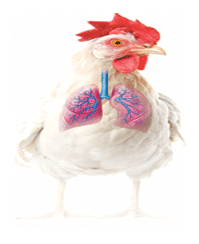
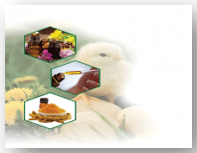
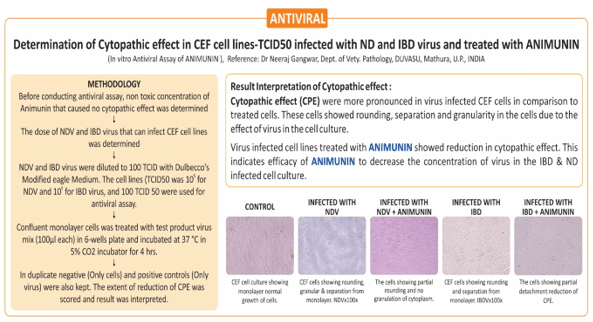
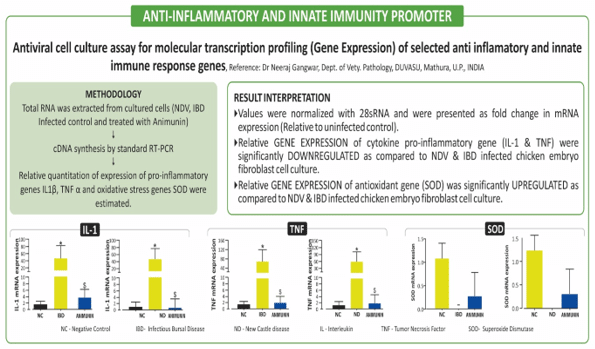
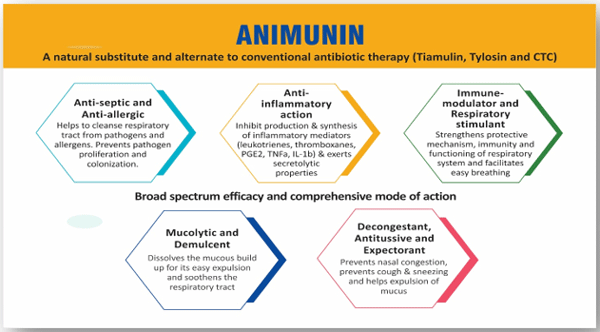
Awad F, Chhabra R, Baylis M, Ganapathy K. An overview of infectious bronchitis virus in chickens. World’s Poultry Sci J. 2019;70(2):375–384. [Google Scholar]
Cavanagh D. Coronavirus avian infectious bronchitis virus. Vet Res. 2007;38(2):281–297. [PubMed] [Google Scholar]
Jackwood MW, Rosenbloom R, Petteruti M, Hilt DA, McCall AW, Williams SM. Avian coronavirus infectious bronchitis virus susceptibility to botanical oleoresins and essential oils in vitro and in vivo. Virus Res. 2010;149(1):86–94. [PMC free article] [PubMed] [Google Scholar]
Lelesius R, Karpovaite A, Mickiene R, Drevinskas T, Tiso N, Ragazinskiene O, Kubiliene L, Maruska A, Salomskas A. In vitro antiviral activity of fifteen plant extracts against avian infectious bronchitis virus. BMC Vet Res. 2019;15(1):178. [PMC free article] [PubMed] [Google Scholar]
Li H, Wu J, Zhang Z, Ma Y, Liao F, Zhang Y, Wu G. Forsythoside a inhibits the avian infectious bronchitis virus in cell culture. Phytother Res. 2011;25(3):338–342. [PMC free article] [PubMed] [Google Scholar]
Li J, Yin J, Sui X, Li G, Ren X. Comparative analysis of the effect of glycyrrhizin diammonium and lithium chloride on infectious bronchitis virus infection in vitro. Avian Pathol. 2009;38(3):215–221. [PubMed] [Google Scholar]
Li M, Wang XY, Wei P, Chen QY, Wei ZJ, Mo ML. Serotype and genotype diversity of infectious bronchitis viruses isolated during 1985–2008 in Guangxi China. Arch Virol. 2012;157(3):467–474. [PubMed] [Google Scholar]
Neeraj Gangwar1, Ajay Singh2, Soumen Choudhary3 and Shivi Maini, P240, Compendium of International Poultry Scientific Forum, Atlanta, USA, 2022
Tabassom MS, L AG, Vahid K, Abbas B, Naser S. The effect of Allium sativum (Garlic) extract on infectious bronchitis virus in specific pathogen free embryonic egg. Avicenna Phytomed. 2016;6:458–467. [PMC free article] [PubMed] [Google Scholar]
Wani AR, Yadav K, Khursheed A, Rather MA. An updated and comprehensive review of the antiviral potential of essential oils and their chemical constituents with special focus on their mechanism of action against various influenza and coronaviruses. Microb Pathog. 2021;152:104620. [PMC free article] [PubMed] [Google Scholar]
Zhang P, Liu X, Liu H, Wang W, Liu X, Li X, Wu X. Astragalus polysaccharides inhibit avian infectious bronchitis virus infection by regulating viral replication. Microb Pathog. 2018;114:124–128. [PMC free article] [PubMed] [Google Scholar]
Zhang,1 Xiao-Yan Li,1 Bing-Sha Zhang,1 Li-Na Ren,1 Yan-Peng Lu,1 Jin-Wen Tang,1 Di Lv,1 Lu Yong,1 Li-Ting Lin,1 Zi-Xue Lin,1 Qin Mo,2 and Mei-Lan Mo1 In vivo antiviral effect of plant essential oils against avian infectious bronchitis virus. BMC Vet Res. 2022; 18: 90.




United States













